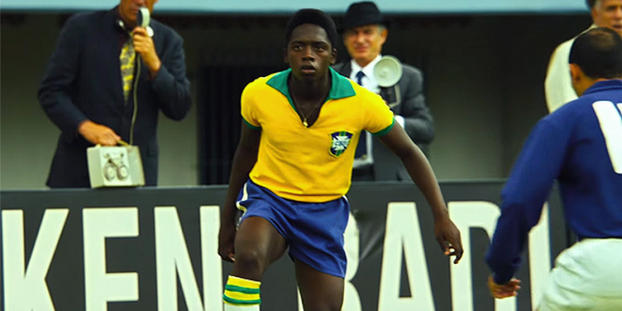
 Pelé: Birth of a Legend pays idol-worshipping homage to
the titular Brazilian soccer great who would go one to become arguably
the greatest to play the sport. The film covers about eight
years of the life of Edson Arantes do Nascimento, better known as Pelé
(a name borne from a youthful insult he would later embrace), from his
young childhood as a nine-year-old boy from an poor Sao Paulo family in 1950,
through his debut on the biggest stage of all for fans of soccer (aka,
football to most of the world outside of the United States), in the
1958 FIFA World Cup in Sweden, where he would be instrumental in helping Brazil win
the championship.
Pelé: Birth of a Legend pays idol-worshipping homage to
the titular Brazilian soccer great who would go one to become arguably
the greatest to play the sport. The film covers about eight
years of the life of Edson Arantes do Nascimento, better known as Pelé
(a name borne from a youthful insult he would later embrace), from his
young childhood as a nine-year-old boy from an poor Sao Paulo family in 1950,
through his debut on the biggest stage of all for fans of soccer (aka,
football to most of the world outside of the United States), in the
1958 FIFA World Cup in Sweden, where he would be instrumental in helping Brazil win
the championship.
Written and directed by documentarians Jeff and Michael Zimbalist (Youngstown
Boys, The Two Escobars) as if it were a
kids' movie, Birth of a Legend is a clunky and wholly clichéd
sports biopic, full of rudimentary dialogue (in English, even though,
oddly, people also write and say a few expressions in Portuguese),
sappy and melodramatic emotional beats, contrived and highly
embellished story elements, and some of the most amateurish acting
you'll likely see in a big-screen release in 2016.
On the plus
side, the film is colorfully shot by Oscar-nominated cinematographer
Matthew Libatique (Money Monster,
Chi-Raq) in Pelé's home land of Brazil, mostly in Rio de
Janeiro, and some of the on-the-field action is moderately fun to
watch, particularly when we see Pelé shred through many defenders with
his dexterity and amazing physical prowess -- he really is like a
dancer out in the green. Unfortunately, even these scenes are
marred by so many close-ups, cuts and jittery camera work (the credits
list three editors employed to chop
this up to near incoherence) that it's hard to truly appreciate the
athleticism involved in watching players at the highest level of their
game do their thing. As such, the footage of the real Pelé, who
also makes a blink-and-you'll-miss-him cameo in the film, that adorns
the end credits is more exciting than the in-film action.
Alas, the soccer action only takes up about a quarter of the film,
with the rest of it pushing forward saccharine and superficial
character development, in continuously trying to push forward the
notion that the Brazilian team were extreme underdogs who really had
no business being in the World Cup, much less the Championship game.
While the true story of Pelé being able to come from the humblest of
origins practicing barefoot with his father (Jorge,
City of God) or friends, to later
become an international hero practically overnight, is something of
great inspiration, the way this plot is developed feels unoriginal,
coming across like just about every other underdog sports story we've
seen for the last several decades, all coated with the out-of-place
percussive rhythms of the A.R. Rahman (The
Hundred-Foot Journey, Million
Dollar Arm) score.
After the beginning chapters in which a young Nascimento plays
schoolyard and street sports with his friends in a way that often
resembles to soccer what The Sandlot does for
baseball, Kevin de Paula plays Pelé during his teenage years,
with a plotline that isn't so far from that of Luke Skywalker's in
Star Wars, showing his meager beginnings dreaming to leave and
find his destiny as a soccer great, only for his parents to tell him
to put those dreams on hold to work on his education because his
father led a not-so-noble life as a result of those pursuits.
And like Luke, he learns to trust something greater than the game, but
instead of the Force, it's 'ginga', a Brazilian mix of capoeira-tinged
martial arts and dance tradition that has all but become forbidden to
employ over the years. Whenever Pelé finds the odds
overwhelming, he call call upon ginga to guide their way to victory,
even when his coach (played in hammy fashion by poorly accented
Vincent D'Onofrio, Jurassic World) and others tell him to trust in proven European
soccer techniques and strategies.
At the end of the film, while you'll come to appreciate the young
phenom that was Pelé, you'll probably walk out without that kind of
jubilation that the filmmakers try to inspire. For a film that
consistently extols the beauty of soccer, it so often feels like there
isn't much joy to be had in the playing of the sport so much as the
winning of the games on the world stage. If you're interested,
check out Pelé's exciting real-life footage on YouTube instead and let the man
himself show you in an instant why he would become beloved around the
world, saving yourself the hundred minutes of mostly bad sports drama
that precedes it that's unbefitting of a legend.
Qwipster's rating:







©2016 Vince Leo

 Pelé: Birth of a Legend pays idol-worshipping homage to
the titular Brazilian soccer great who would go one to become arguably
the greatest to play the sport. The film covers about eight
years of the life of Edson Arantes do Nascimento, better known as Pelé
(a name borne from a youthful insult he would later embrace), from his
young childhood as a nine-year-old boy from an poor Sao Paulo family in 1950,
through his debut on the biggest stage of all for fans of soccer (aka,
football to most of the world outside of the United States), in the
1958 FIFA World Cup in Sweden, where he would be instrumental in helping Brazil win
the championship.
Pelé: Birth of a Legend pays idol-worshipping homage to
the titular Brazilian soccer great who would go one to become arguably
the greatest to play the sport. The film covers about eight
years of the life of Edson Arantes do Nascimento, better known as Pelé
(a name borne from a youthful insult he would later embrace), from his
young childhood as a nine-year-old boy from an poor Sao Paulo family in 1950,
through his debut on the biggest stage of all for fans of soccer (aka,
football to most of the world outside of the United States), in the
1958 FIFA World Cup in Sweden, where he would be instrumental in helping Brazil win
the championship.